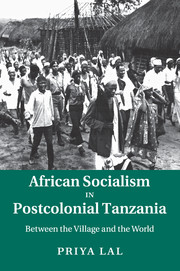23 results
9 - Decolonization and the Gendered Politics of Developmental Labor in Southeastern Africa
- from Part II - Development in a Decolonizing World: Between Local and Global
-
-
- Book:
- The Development Century
- Published online:
- 03 September 2018
- Print publication:
- 06 September 2018, pp 173-194
-
- Chapter
- Export citation
Emma Hunter. Political Thought and the Public Sphere in Tanzania: Freedom, Democracy, and Citizenship in the Era of Decolonization. New York: Cambridge University Press, 2015. 259 pp. Paper. £21.99. ISBN: 9781107458628.
-
- Journal:
- African Studies Review / Volume 61 / Issue 2 / July 2018
- Published online by Cambridge University Press:
- 15 May 2018, pp. 260-262
-
- Article
- Export citation
Erratum
-
- Journal:
- African Studies Review / Volume 61 / Issue 2 / July 2018
- Published online by Cambridge University Press:
- 15 May 2018, p. 282
-
- Article
-
- You have access
- HTML
- Export citation
Emma Hunter. Political Thought and the Public Sphere in Tanzania: Freedom, Democracy and Citizenship in the Era of Decolonization. New York: Cambridge University Press, 2015. xv + 259 pp. Acknowledgments. Map of Tanzania. List of abbreviations. References. Index. $95.00. Cloth. ISBN: 9781107088177.
-
- Journal:
- African Studies Review / Volume 60 / Issue 2 / September 2017
- Published online by Cambridge University Press:
- 07 June 2017, pp. 251-253
-
- Article
- Export citation
3 - Uneven Development and the Region
-
- Book:
- African Socialism in Postcolonial Tanzania
- Published online:
- 05 December 2015
- Print publication:
- 01 December 2015, pp 129-176
-
- Chapter
- Export citation
Index
-
- Book:
- African Socialism in Postcolonial Tanzania
- Published online:
- 05 December 2015
- Print publication:
- 01 December 2015, pp 257-265
-
- Chapter
- Export citation
Contents
-
- Book:
- African Socialism in Postcolonial Tanzania
- Published online:
- 05 December 2015
- Print publication:
- 01 December 2015, pp v-vi
-
- Chapter
- Export citation
Copyright page
-
- Book:
- African Socialism in Postcolonial Tanzania
- Published online:
- 05 December 2015
- Print publication:
- 01 December 2015, pp iv-iv
-
- Chapter
- Export citation
2 - Militants, Mothers, and the National Family
-
- Book:
- African Socialism in Postcolonial Tanzania
- Published online:
- 05 December 2015
- Print publication:
- 01 December 2015, pp 78-128
-
- Chapter
- Export citation
Acknowledgements
-
- Book:
- African Socialism in Postcolonial Tanzania
- Published online:
- 05 December 2015
- Print publication:
- 01 December 2015, pp ix-xii
-
- Chapter
- Export citation

African Socialism in Postcolonial Tanzania
- Between the Village and the World
-
- Published online:
- 05 December 2015
- Print publication:
- 01 December 2015
Bibliography
-
- Book:
- African Socialism in Postcolonial Tanzania
- Published online:
- 05 December 2015
- Print publication:
- 01 December 2015, pp 241-256
-
- Chapter
- Export citation
1 - A Postcolonial Project in the Cold War World
-
- Book:
- African Socialism in Postcolonial Tanzania
- Published online:
- 05 December 2015
- Print publication:
- 01 December 2015, pp 27-77
-
- Chapter
- Export citation
Frontispiece
-
- Book:
- African Socialism in Postcolonial Tanzania
- Published online:
- 05 December 2015
- Print publication:
- 01 December 2015, pp xiii-xvi
-
- Chapter
- Export citation
List of Figures and Maps
-
- Book:
- African Socialism in Postcolonial Tanzania
- Published online:
- 05 December 2015
- Print publication:
- 01 December 2015, pp vii-viii
-
- Chapter
- Export citation
Introduction
-
- Book:
- African Socialism in Postcolonial Tanzania
- Published online:
- 05 December 2015
- Print publication:
- 01 December 2015, pp 1-26
-
- Chapter
- Export citation
Conclusion
-
- Book:
- African Socialism in Postcolonial Tanzania
- Published online:
- 05 December 2015
- Print publication:
- 01 December 2015, pp 227-240
-
- Chapter
- Export citation
4 - Remembering Villagization
-
- Book:
- African Socialism in Postcolonial Tanzania
- Published online:
- 05 December 2015
- Print publication:
- 01 December 2015, pp 177-226
-
- Chapter
- Export citation
DECOLONIZING AFRICA REVISITED - African Intellectuals and Decolonization. Edited by Nicholas Creary. Athens, OH: Ohio University Press, 2012. Pp. viii + 183. $19.95, hardback (isbn978-0-89680-2834).
-
- Journal:
- The Journal of African History / Volume 55 / Issue 2 / July 2014
- Published online by Cambridge University Press:
- 29 May 2014, pp. 275-276
- Print publication:
- July 2014
-
- Article
- Export citation



